Related Research Articles

The Syrian Arab Armed Forces are the military forces of the Syrian Arab Republic. They consist of the Syrian Army, Syrian Air Force, Syrian Navy, Syrian Air Defense Force, and paramilitary forces, such as the National Defence Forces. According to the Constitution of Syria, the President of Syria is the Commander-in-chief of the Armed Forces. Minister of Defense holds the position of Deputy Commander-in-chief of the Army and Armed Forces.

Free France was a political entity claiming to be the legitimate government of France following the dissolution of the Third Republic during World War II. Led by General Charles de Gaulle, Free France was established as a government-in-exile in London in June 1940 after the Fall of France to Nazi Germany. It joined the Allied nations in fighting Axis forces with the Free French Forces, supported the resistance in Nazi-occupied France, known as the French Forces of the Interior, and gained strategic footholds in several French colonies in Africa.
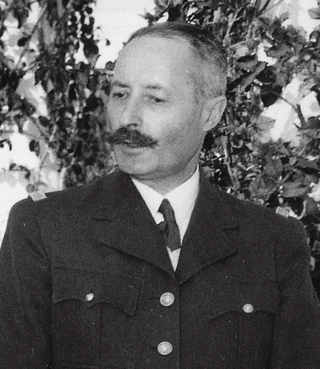
Henri Honoré Giraud was a French military officer who was a leader of the Free French Forces during the Second World War until he was forced to retire in 1944.

Marie Joseph Pierre François Kœnig or Koenig was a French general during World War II during which he commanded a Free French Brigade at the Battle of Bir Hakeim in North Africa in 1942. He started a political career after the war and was posthumously elevated to the dignity of Marshal of France in 1984.
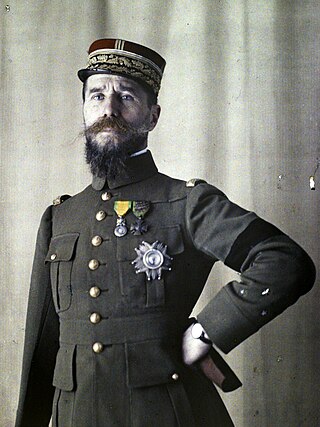
Henri Joseph Eugène Gouraud was a French general, best known for his leadership of the French Fourth Army at the end of the First World War. Following this, he became the first High Commissioner of the Levant (1919–1922) then Military governor of Paris (1923–1937).

The Syria–Lebanon campaign, also known as Operation Exporter, was the invasion of Syria and Lebanon in June and July 1941 by British Empire forces, during the Second World War.

The Syrian Army, officially the Syrian Arab Army, is the land force branch of the Syrian Armed Forces. It is the dominant military service of the four uniformed services, controlling the most senior posts in the armed forces, and has the greatest manpower, approximately 80 percent of the combined services. The Syrian Army originated in local military forces formed by the French after World War I, after France obtained a mandate over the region. It officially came into being in 1945, before Syria obtained full independence the following year.

The Great Syrian Revolt, also known as the Revolt of 1925, was a general uprising across the State of Syria and Greater Lebanon during the period of 1925 to 1927. The leading rebel forces initially comprised fighters of the Jabal Druze State in southern Syria, and were later joined by Sunni, Druze and Shiite and factions all over Syria. The common goal was to end French occupation in the newly mandated regions, which passed from Turkish to French administration following World War I.
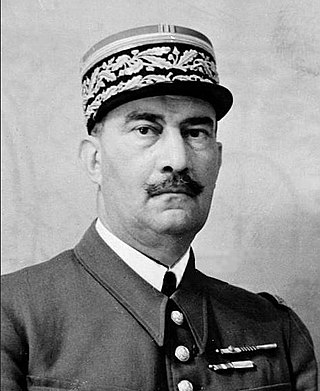
Henri Fernand Dentz was a general in the French Army who served with the Vichy French Army after France surrendered during the Second World War. He was tried as a collaborator after the war.

The 1st Marine Infantry Parachute Regiment or 1er RPIMa is a unit of the French Army Special Forces Command, therefore part of the Special Operations Command.

Edgard de Larminat was a French general, who fought in two World Wars. He was one of the most important military figures who joined the Free French forces under the British in 1940. He was awarded the Ordre de la Libération.

The 1st Free French Division was one of the principal units of the Free French Forces (FFL) during World War II, renowned for having fought the Battle of Bir Hakeim.
The Army of the Levant identifies the armed forces of France and then Vichy France which occupied, and were in part recruited from, the French Mandated territories in the Levant during the interwar period and early World War II. The locally recruited Syrian and Lebanese units of this force were designated as the Special Troops of the Levant.
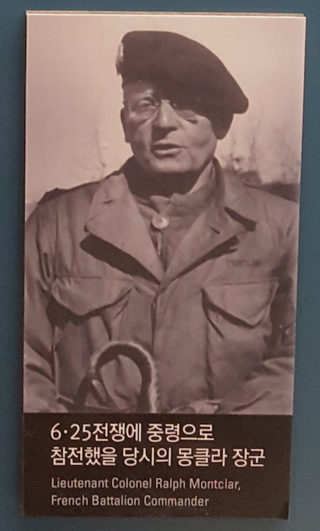
Raoul Charles Magrin-Vernerey, also known as Ralph Monclar was a French officer and 2nd Inspector of the Foreign Legion who fought in World War I, World War II within the ranks of the Free French Forces and led the French Battalion in the Korean War. He was also one of the first senior officers to respond to the Appeal of 18 June.

The 1st Spahi Regiment is an armored regiment of the modern French Army, previously called the 1st Moroccan Spahi Regiment. It was established in 1914 as a mounted cavalry unit recruited primarily from indigenous Moroccan horsemen. The regiment saw service in the First World War, and in the Second World War as part of the Forces Françaises Libres, as well as post-war service in the French-Indochina War and elsewhere. The modern regiment continues the traditions of all former Spahi regiments in the French Army of Africa.

The 6th Foreign Infantry Regiment was a Foreign Legion infantry regiment that served in the French Army from 1939 to 1941 and again from 1949 to 1955.
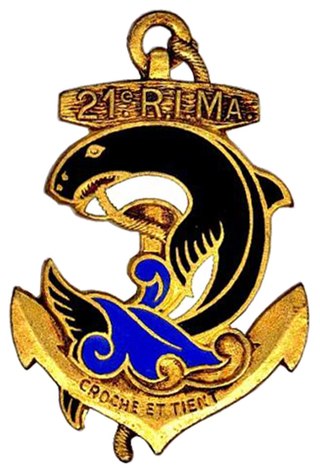
The 21st Marine Infantry Regiment is an infantry regiment of the Troupes de Marine issued by filiation from the 2e RIC.

Hrant Maloyan, also known as Hrant Bek, was a Syrian-Armenian military serviceman who became the general officer of the Syrian army and was appointed General Command of the Internal Security Forces in Syria.
Pierre Georges Fernand Darmuzai was a French Général who served an entire career in the formation of the Parachute Battalions and Regiments BEPs and REPs of the Foreign Legion.

The Levant Crisis, also known as the Damascus Crisis, the Syrian Crisis, or the Levant Confrontation, was a military confrontation that took place between British and French forces in Syria in May 1945 soon after the end of World War II in Europe. French troops had tried to quell nationalist protests in Syria at the continued occupation of the Levant by France. With hundreds of Syrian nationalists being killed by French troops, British Prime Minister Winston Churchill, wanting to maintain friendly relations with the Arabs, opposed French action and sent British forces into Syria from Transjordan with orders to fire on the French if necessary.
References
- 1 2 3 4 5 Bruno, Duval (3 November 2021). "Le général Fernand Olive, un personnage historique méconnu, enterré à Bages". L'Indépendant (in French).
- ↑ Bruchez, Anne (2005). "La fin de la présence française en Syrie : de la crise de mai 1945 au départ des dernières troupes étrangères". Relations Internationales (in French). 122 (122): 17–32. doi: 10.3917/ri.122.0017 .